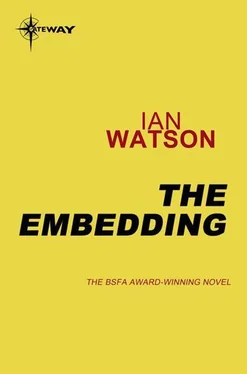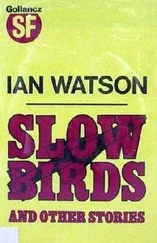Ian Watson - The Embedding
Здесь есть возможность читать онлайн «Ian Watson - The Embedding» весь текст электронной книги совершенно бесплатно (целиком полную версию без сокращений). В некоторых случаях можно слушать аудио, скачать через торрент в формате fb2 и присутствует краткое содержание. Жанр: Фантастика и фэнтези, на английском языке. Описание произведения, (предисловие) а так же отзывы посетителей доступны на портале библиотеки ЛибКат.
- Название:The Embedding
- Автор:
- Жанр:
- Год:неизвестен
- ISBN:нет данных
- Рейтинг книги:4 / 5. Голосов: 1
-
Избранное:Добавить в избранное
- Отзывы:
-
Ваша оценка:
- 80
- 1
- 2
- 3
- 4
- 5
The Embedding: краткое содержание, описание и аннотация
Предлагаем к чтению аннотацию, описание, краткое содержание или предисловие (зависит от того, что написал сам автор книги «The Embedding»). Если вы не нашли необходимую информацию о книге — напишите в комментариях, мы постараемся отыскать её.
The Embedding — читать онлайн бесплатно полную книгу (весь текст) целиком
Ниже представлен текст книги, разбитый по страницам. Система сохранения места последней прочитанной страницы, позволяет с удобством читать онлайн бесплатно книгу «The Embedding», без необходимости каждый раз заново искать на чём Вы остановились. Поставьте закладку, и сможете в любой момент перейти на страницу, на которой закончили чтение.
Интервал:
Закладка:
“Self-embedding is a special use of what we call ‘recursive rules’—these are rules for doing the same thing more than once when you form a sentence, so that you can make your sentence any shape and size you like. Animals have to rely on a fixed set of signals for communication purposes—or else on varying the strength of the same signal. But we humans aren’t limited like that. Every sentence we construct is a fresh creation. That’s because of this recursive feature. The dog and the cat and the bear ate.’ ‘They ate the bread and cheese and fruit, lustily and greedily.’ You’ve never heard these particular sentences before—they’re new—but you have no trouble understanding them. That’s because we’ve got this flexible, creative programme for language in our minds. But self-embedding pushes the human mind pretty near its limits—which is why we can use it as a probe at the frontier—”
“Better give us an example of this self-embedding, Chris,” interrupted Sam. “This is all getting a bit theoretical for my head.”
Sole glanced at Sam curiously. Surely Sam knew perfectly well what he was talking about, too. Jannis sat back smugly, his expression implying that he was well out of this—how had he put it?—jumping through the hoops.
Still, if that was how Sam wanted it…
“Let’s take a nursery rhyme then—this one’s a beautiful recursive series, dead easy to follow…”
As he started reciting it, however, a memory from boyhood triggered itself in his head—and he was seven years old again, standing up in Sunday School to pipe out the same nursery rhyme as part of a Harvest Festival. He’d fluffed his lines, halfway through. Had to be prompted. The experience stuck in his nervous system, a tiny thorn of shame. Now the thorn reemerged, producing a sudden, silly anxiety to get through the recitation safely—which made him come unstuck again, and sit there openmouthed, waiting to be prompted…
“This is the farmer sowing his corn,
That kept the cock that crowed in the morn,
That wakened the priest all shaven and shorn,
That—”
That what? WHAT WHAT WHAT? a childish voice yammered inside his head—while another area of him watched this idiotic repetition of events and wondered to what extent all his fascination with language, particularly ‘bad’ language, sprang from this original public shaming…
A soft American voice came to his rescue…
“That married the man all tattered and torn—
“Come along, Chris,” grinned Zwingler.
Gratefully the boy in Sole caught up the broken rhyme again.
“That kissed the maiden all forlorn—”
But the man in him halted suspiciously. Richard, Sam, Dorothy, pop-eyed Friedmann all seemed part of a grinning audience of parents watching him…
However the American hurried him on, exuberantly chanting the next couple of phrases:
“That milked the cow with the crumpled horn,
That tossed the dog—”
“That chased the cat,” said Sole tentatively.
“That worried the rat!” responded Zwingler, quick as a flash.
“That ate the malt,” smiled Sole.
“That lay in the house that Jack built!”
Zwingler ended in triumph. His rubies flashed a victory dance. He’d captured the rhyme. A game had been set up—and he’d won it.
Damn, thought Sole, I ought to have counted ahead. Glancing at Jannis, he caught a hint of angry disgust. A trap had been set by a smart operator, and he’d fallen into it. It was that bloody memory getting in the way. A language trap too—he should have known better.
“Any four-year-old can follow that nursery rhyme,” Sole fired back, his face flushed. “It’s another story when you embed the same phrases. This is the malt that the rat that the cat that the dog worried killed ate.’ How about that? Grammatically correct—but you can hardly understand it. Take the embedding a bit further and you end up with the situation in Roussel’s poem. The Surrealists tried building machines for reading Roussel. But the most sensitive, flexible device we know of for processing language—our own brain—is stymied.”
“Why’s that, Chris?”
Zwingler’s face seemed to leer at him—but the American sounded genuinely interested. Uncomfortably Sole hurried through a brief explanation; noticing as he did so that Sam looked pleased.
“Well, speech processing depends on the volume of information the brain can store short-term—”
“This amount being limited by the time it takes short-term memory to become permanent and chemical, instead of electrical?”
“Right. But a permanent form isn’t practical for every single word—we only need remember the basic meaning. So you’ve got one level of information—that’s the actual words we use, on the surface of the mind. The other permanent level, deep down, contains highly abstract concepts—idea associations linked together network-style. In between these two levels comes the mind’s plan for making sentences out of ideas. This plan contains the rules of what we call Universal Grammar—we say it’s universal, as this plan is part of the basic structure of mind and the same rules can translate ideas into any human language whatever—”
“All languages being cousins beneath the skin, in other words?”
“Right again. They resemble each other like faces in a family. But each cousin’s face has its own individual outlook on reality. If we could simply stack all these ‘faces’ one on top of another to work out the rules of universal grammar that way—well, we’d have a map of the whole possible territory of human thought—everything we can ever hope to express, as a species.”
“But you couldn’t just stack all these languages, could you? Some have died out and disappeared—”
“And a whole lot more might exist, but they haven’t been invented.”
“Which is why you’re using artificial languages as frontier probes?”
“Exactly.”
“But Chris. You’re using this PSF chemical, to teach them. What makes you think it’s a natural situation? Surely our brains would have learnt at this higher rate if they were intended to, biologically—”
“Aha—and God would have given us wings if he’d meant us to fly! Not that old argument, please. PSF is just an aid, as its name implies.”
“Hmm. How long did you carry out animal tests first?”
“It isn’t the same thing!” Sole said exasperatedly. “You can’t teach language to a monkey or a guinea pig.”
“Okay, you’re the expert,” shrugged Zwingler. “They’re picking up this embedded speech at any rate—?”
Sole darted a brief smile at Rosson.
“I’d say it’s promising, eh, Lionel?”
“More than that,” nodded Rosson, with a grin of satisfaction. He too loved the children down below.
Zwingler glanced at his watch.
“May I see downstairs now, Sam? I think I get the picture.”
There was a sudden minor explosion like a whip crack as Jannis slapped the side of his head with his fingers.
“Listen Sam, if he’s in a hurry, he can see the kids just as easy over the closed circuit from next door—”
“Don’t be tiresome, Richard,” sighed the Director. “We already agreed Tom’s not going into any of the worlds.”
“I should bloody well hope not!” snapped Jannis, his voice toughening.
The Director touched Zwingler on the arm, in embarrassment.
“If you went inside—well, it’s like contaminating a cell culture with a foreign body: a word out of place could be pretty awkward, Tom.”
“That sounds like the understatement of the afternoon,” glowered Jannis.
But the American waved a ruby at him, blandly.
“By no means, Mr Jannis. The understatement of the afternoon, if not of the whole damn decade, was Sam’s crack earlier on. About emissaries—”
Читать дальшеИнтервал:
Закладка:
Похожие книги на «The Embedding»
Представляем Вашему вниманию похожие книги на «The Embedding» списком для выбора. Мы отобрали схожую по названию и смыслу литературу в надежде предоставить читателям больше вариантов отыскать новые, интересные, ещё непрочитанные произведения.
Обсуждение, отзывы о книге «The Embedding» и просто собственные мнения читателей. Оставьте ваши комментарии, напишите, что Вы думаете о произведении, его смысле или главных героях. Укажите что конкретно понравилось, а что нет, и почему Вы так считаете.












